Covid UK: Universities plan to continue Zoom lectures in the autumn term
Prestigious UK universities including the London School of Economics (LSE) and St Andrews are planning to continue Zoom lectures in the autumn term, sparking a backlash from students who are calling for refunds in £9,000 tuition fees after 14 months of lockdown disruption.
University College London is preparing for a blend of online and campus teaching, with different approaches depending on the course. Information for next year’s students says: ‘Some will be mostly online and others completely online if all learning outcomes can be met this way’, according to the BBC.
LSE is expecting the ‘vast majority’ of seminars and classes to be taught in-person, but that lectures will be ‘largely delivered online’ in a blow to thousands of students eager to return to campuses this autumn.
Academics at Liverpool University have been told that lectures will take place ‘mostly online’ next academic year, while Nottingham University said ‘large scale’ lectures with ‘high numbers’ of students will be delivered remotely.
The University of Manchester is planning a ‘blended approach, with a mix of both on-campus and online element’, and St Andrews and the University of Edinburgh across the border are expecting large lectures to be online.
One London academic, who spoke on condition of anonymity, told the BBC that there would be financial savings for universities from reducing staffing levels and making a longer-term shift to keeping classes online.
The higher education watchdog warned that a further roll-out of online lectures must not lead to a drop in standards, and threatened to intervene if the quality of teaching fell short.
But the move has been met with fury by students at the University of Leeds who argue there is no reason in-person teaching cannot resume if they are allowed to meet with friends and family indoors in pubs and restaurants.
In a petition which now calls for a reimbursement of £9,000 tuition fees, they branded plans for another term of online lectures ‘unacceptable’ and thundered: ‘Online teaching is in no way a substitute for in-person learning’. Around half of students in England have only been able to return to face-to-face teaching this week.
A University of Leeds spokesman said: ‘We intend to give every student a substantial on-campus experience throughout next semester, including multiple face-to-face sessions each week.’ However, large lectures ‘will be delivered online as part of an overall hybrid approach’.
Nicola Dandridge, chief executive of the Office for Students, told the Telegraph: ‘No matter what teaching methods universities and colleges use, they must provide a consistently good courses for all students. As the regulator we have powers to step in where this is not the case.’
Nick Hillman, director of the Higher Education Policy Institute, added that universities should be ‘cautious’ about moving courses online and warned that the move will not go down well with students.

British universities including the London School of Economics (LSE) and St Andrews are planning to continue Zoom lectures in the autumn term
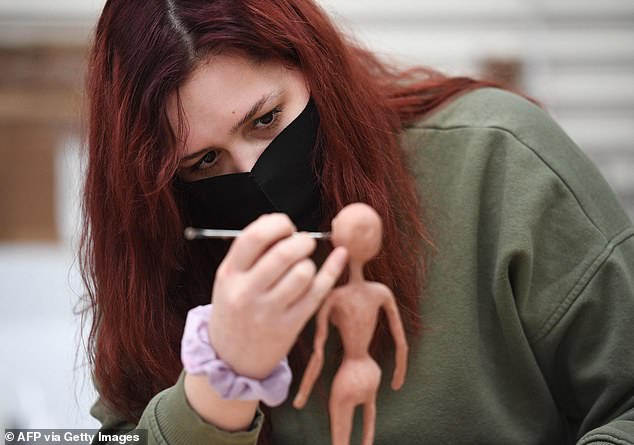
A third year student studying model making for TV and film works at the University of Bolton
Angry students in Leeds supporting a petition for reimbursement of tuition fees said it was ‘ridiculous’ and a ‘disgrace’ to maintain virtual teaching. They called for a ‘complete return to in-person teaching’.
One petitioner wrote: ‘Now children are in school fulltime, people are back in the workplace and the general public can visit pubs, theatres and cinemas… there is absolutely no need for any lectures to remain online.’
A parent backing the petition added: ‘My daughter has had an awful year stuck in her room… Get a grip please.’ Leeds students’ union said it is planning a survey of students’ experience of online learning this year and what they want for next year.
But the National Union of Students claimed there could be some positive advantages in teaching online.
Hillary Gyebi-Ababio, the union vice president, said: ‘Online lectures, remote access to resources and other digital provision has significantly improved access to education and, offered alongside in-person teaching, gives students greater choice over how they learn.’
Nicola Dandridge, chief executive of the Office for Students, said : ‘No matter what teaching methods universities and colleges use, they must provide consistently good courses for all students.’
She added that universities had to provide ‘timely and clear information for students on how their courses will be taught next year’.
A spokeswoman for Universities UK said universities were trying to plan without knowing what restrictions would be in place in the autumn – and that students would still have access to facilities even if lectures were virtual.
A Department for Education (DfE) spokeswoman said: ‘Universities have a strong track record in delivering excellent blended tuition, and we have been clear that quality and quantity should not drop.’
It comes as data from the Official for National Statistics (ONS) suggests that around three-quarters of students (76 per cent) are living at the same address as they were at the start of the autumn term.
The stay-at-home order to a million students has led to a huge fall in the morale and mental health of young people who had hoped to be living at universities.
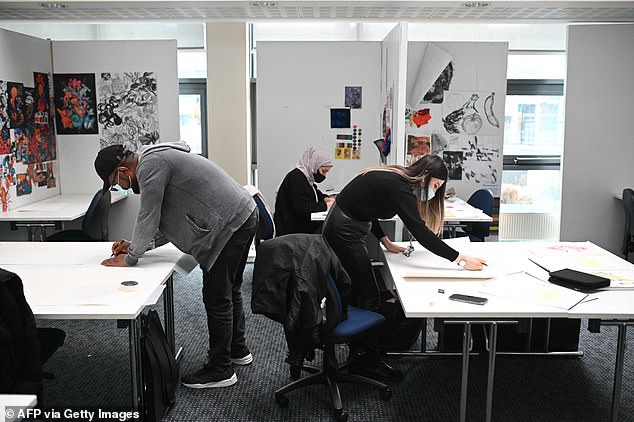
British universities including the London School of Economics (LSE) and St Andrews are planning to continue Zoom lectures in the autumn term
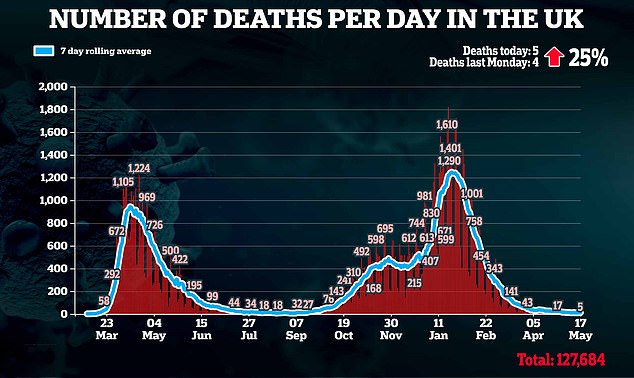
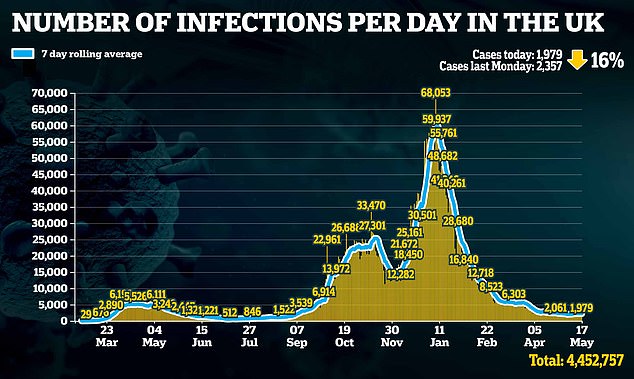
Surveys carried out by the ONS have found plummeting levels of well-being among students and levels of loneliness more than four times higher than among the population as a whole.
Students who need additional mental health support, or who do not have access to appropriate study spaces in their vacation accommodation, are allowed to return to term-time accommodation.
Other university leaders have criticised the Government for delaying the return of face-to-face lessons for all students until now.
Chloe Baker, a first-year English Literature student at the University of Reading, does not have any face-to-face lessons this week as she has exams – which end at the start of June.
The 20-year-old told the PA news agency: ‘I do think that the course price should definitely be lowered. £9,000 is quite a lot for an online course basically.
‘It only hit me recently that the year is almost over and I didn’t really have much in-person teaching at all. So that did shock me to be honest.’
She added: ‘I would have appreciated it definitely if it [in-person lessons] had started earlier because now it is the summer term and there’s not really much teaching at all going on at the moment. There’s a lot more people back for the exam season. But pretty soon people will be leaving again and it will start to get empty, which is strange.’
Most students in England, apart from those on critical courses, were told not to travel back to university as part of the third lockdown announced in January.
Students on practical courses, who require specialist equipment and facilities, began returning to face-to-face teaching on March 8.
But it is estimated that around half of students, including many arts and humanities students, were not able to return to in-person lessons until now.
Ms Gyebi-Ababio, vice president for higher education at the National Union of Students (NUS), said: ‘In reality, only a small portion of students will be travelling back to university today.
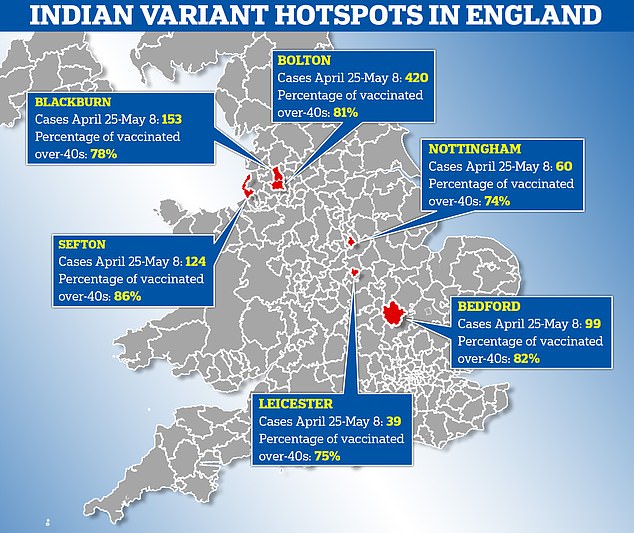
NHS figures show that vaccine uptake among all over-40s, which is at 83 per cent average across England, is below average in all but one (Sefton) of the Indian variant hotspot areas. Although experts do not think the at-risk older age groups are the ones driving outbreaks at the moment, it could be cause for concern if the virus spreads to them
‘At this point in the term, most teaching is finished, many students are already on placements or have decided they’re better off waiting until the next academic year to return. A significant number of students will have returned to term-time accommodation weeks ago, wanting to make use of the accommodation they were still forced to pay out for.
‘With widespread financial insecurity facing students, it is disheartening that so many are having to make decisions around accessing their education based on affordability. Students deserve better than what they’ve experienced this year.’
Ian Dunn, Coventry University provost, said the Government’s decision not to allow all students to resume in-person lessons until now – when other restrictions were lifted last month – seemed ‘perverse’.
He told PA: ‘A third of my students are international and of the two thirds that are not international, half are commuting and half are residential. So the idea that we’d have this enormous movement of people around the country I think was not necessarily very obvious.
‘As for the ‘why open pubs before you open universities?’, I think it goes counter to what the Government was saying very clearly that education was the most important thing and that didn’t seem to be the case when it came to April 12.’
Mr Dunn said students who still have teaching this term are being offered a blended learning approach – with five hours of in-person lessons a week and the rest of lessons online.
He said: ‘There are undoubtedly more students on campus today, but we are making provision available fully online. Some students have opted for that and we’ve tried to give them the choice they wish to make.’
For university courses that do still have some teaching left, returning students are expected to get tested for Covid-19 twice a week throughout the term.
At the University of Hull, students said it was ‘really nice’ to see people returning to the campus. Face-to-face lectures were taking place at the Cottingham Road site on Monday, while cafes and bars welcomed the return of customers indoors.
James Aygun, a third-year drama and theatre practice student, said it had been ‘really difficult’ to try to study his subject online. He told PA: ‘To be back on campus, it’s been really refreshing. Just to see everyone, it’s so much easier to create theatre, so it’s made our life a lot easier.’
Mr Aygun, who returned to university in March, said: ‘It’s just nice to see everyone back because for the last month we’ve been here on our own pretty much so just to get that camaraderie, it feels so much better when everyone’s around, everyone’s happy.
‘People, especially students, want to immerse themselves with interaction so it’s really important to have everyone back, everyone feeling good, so it’s just really nice.’
Vanessa Wilson, the chief executive of the University Alliance, said: ‘We have been calling for this for many months, and whilst the return is later than hoped, our member universities are ready and prepared to welcome their students back to make the most of this final term with extensive learning and development activities and opportunities; alongside the outstanding face-to-face teaching sessions.’
She added: ‘Alliance universities have a high proportion of commuter students, who have been living locally but unable to access campus. We understand there to be huge demand amongst all students, including those returning from elsewhere, to be allowed back to university for the remainder of term, and we expect numbers will be high.’
Dr Tim Bradshaw, chief executive of the Russell Group, which are traditionally the most selective institutions, said: ‘While many universities are now running examinations, students will be able to take part in a mix of online and in-person teaching, as well as access libraries and other facilities on campus.
‘Universities have also planned additional non-academic activities to help students to develop peer networks and prepare for the world of work. Our universities have worked hard to make their campuses Covid-secure, and we would encourage all students to take up the offer of free twice-weekly testing so we are able to help contain future Covid outbreaks.’
Students have been encouraged to take a test via home or community testing at least one day before they travel back to their term-time accommodation.
All students will be encouraged to take three supervised Covid-19 tests three to four days apart at an asymptomatic testing site on campus. They will then be expected to be tested for Covid-19 twice a week.



